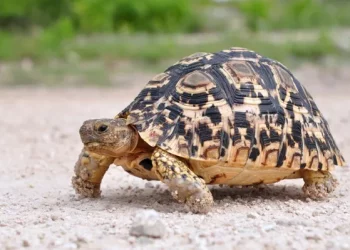Russian tortoises (Agrionemys horsfieldii), also known as Horsfield’s tortoises, are popular pets known for their small size, hardiness, and charming personalities. Native to Central Asia, these tortoises have specific dietary requirements that are crucial for their health and well-being. While they are generally easy to care for, knowing what Russian tortoises cannot eat is essential to prevent nutritional deficiencies, digestive issues, and overall health problems. This article provides a comprehensive guide to the foods that should be avoided when caring for Russian tortoises.
Understanding Russian Tortoise Nutrition
Before delving into specific foods, it’s important to understand the dietary needs of Russian tortoises. These reptiles are primarily herbivorous, meaning their diet consists mainly of plant matter. In the wild, they feed on a variety of grasses, leafy greens, flowers, and occasionally fruits. A balanced diet for a captive Russian tortoise should mimic their natural diet as closely as possible to ensure optimal health.
Primary Dietary Requirements
High Fiber: Russian tortoises require a high-fiber diet to aid in digestion and maintain gut health. Fiber-rich foods help prevent issues such as constipation and impaction, which can be common in captive tortoises.
Calcium and Vitamin D3: Adequate calcium and vitamin D3 are crucial for maintaining strong bones and shell health. Without these nutrients, tortoises can develop metabolic bone disease (MBD), which is a severe and potentially life-threatening condition.
Low Protein and Fat: Unlike some other reptiles, Russian tortoises have low protein and fat requirements. Excess protein and fat can strain their kidneys and liver, leading to health problems over time.
Foods to Avoid for Russian Tortoises
Toxic or Harmful Foods
Certain foods can be toxic or harmful to Russian tortoises and should be strictly avoided. These foods may cause digestive upset, toxicity, or nutrient imbalances that can jeopardize the tortoise’s health.
Toxic Plants
Russian tortoises should never be offered plants that are known to be toxic to reptiles. Some common toxic plants include:
Aloe vera: While beneficial for humans, aloe vera contains compounds that can be toxic to tortoises.
Ivy: Plants in the ivy family (Hedera spp.) can cause digestive issues and toxicity in tortoises.
Daffodils and tulips: These flowers contain toxins that can harm tortoises if ingested.
Poisonous Fruits and Vegetables
Certain fruits and vegetables contain compounds that are harmful to Russian tortoises. These should be avoided to prevent illness or toxicity:
Avocado: Avocado contains persin, which is toxic to many animals, including tortoises.
Rhubarb: The leaves of rhubarb contain oxalic acid, which can interfere with calcium absorption and cause kidney damage.
Tomato leaves and stems: While the tomato fruit itself is generally safe in moderation, the leaves and stems contain solanine, which is toxic to tortoises.
Foods High in Oxalic Acid
Oxalic acid is a substance found in many plants that can bind to calcium, preventing its absorption and potentially leading to calcium deficiency over time. Foods high in oxalic acid should be fed sparingly or avoided altogether:
Spinach: Although nutritious, spinach is high in oxalic acid and can interfere with calcium absorption if fed excessively.
Beet greens: Similar to spinach, beet greens contain oxalic acid and should be fed in moderation.
Parsley: While a popular herb, parsley contains oxalic acid and should be offered infrequently.
Foods High in Phosphorus
High levels of phosphorus can disrupt calcium metabolism in Russian tortoises, leading to metabolic bone disease (MBD) and other health issues. Foods with a high phosphorus to calcium ratio should be limited or avoided:
Meat and animal protein: Russian tortoises are herbivores and should not be fed meat or animal products, which are high in phosphorus and low in calcium.
Commercial dog or cat food: These products are not suitable for tortoises and can be detrimental to their health due to their high protein and phosphorus content.
Safe and Recommended Alternatives
Balanced Diet Options
To ensure the nutritional needs of Russian tortoises are met, it is advisable to offer a variety of safe and nutritious foods:
Leafy greens: Such as dandelion greens, mustard greens, and collard greens, which are high in fiber and low in oxalic acid.
Hay and grasses: Timothy hay and grasses like Bermuda grass provide essential fiber and help wear down the tortoise’s beak and claws.
Edible flowers: Like hibiscus and rose petals, which provide variety and essential nutrients.
See Also: What plants can russian tortoises eat?
Calcium Supplements
In addition to dietary calcium, which should primarily come from their food, Russian tortoises may benefit from occasional calcium supplementation. This is especially important for growing juveniles and females during egg production:
Calcium carbonate powder: Dusting food items with calcium powder can ensure tortoises receive adequate calcium intake.
Vitamin Supplements
While a balanced diet should provide most vitamins, additional supplementation of vitamin D3 may be necessary, especially if the tortoise does not have access to natural sunlight:
Commercial reptile vitamin supplements: These should be used sparingly and according to the manufacturer’s instructions.
Conclusion
Understanding what Russian tortoises cannot eat is crucial for their health and longevity as pets. By avoiding toxic plants, harmful fruits and vegetables, and foods high in oxalic acid or phosphorus, tortoise owners can prevent serious health issues and ensure their pets thrive. Providing a balanced diet rich in fiber, calcium, and essential nutrients will support overall well-being and contribute to a happy and healthy Russian tortoise.
Caring for a Russian tortoise involves more than just providing food; it requires knowledge and attention to dietary requirements that mimic their natural habitat. With proper care and nutrition, Russian tortoises can live long, healthy lives as cherished members of the family.
Related Topics:


























